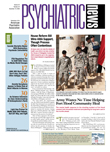The APA Assembly made the difficult decision to reorganize itself and change the roster of representatives who attend its two meetings each year in response to a need to cut its expenses and help the Association close an unexpectedly large budget shortfall.
One of the major changes will see the approximately 50 deputy representatives—who are elected by district branches with 450 or fewer members—no longer funded to attend the November Assembly meeting. (District branches with more than 450 members qualify for up to four additional full representatives, depending on number of members.) Also no longer receiving APA funding for the November meeting will be the member-in-training, early career psychiatrist, and minority/underrepresented group deputy reps, of which there is one for each of APA's seven geographic Areas (see Assembly Meets Challenges of Trying Times). Each of those groups will still have a funded voting representative from each Area at the November meeting.
All Assembly reps, including deputy reps, are responsible for their expenses to the May Assembly meeting, held in conjunction with the APA annual meeting.
Another major change will see a shift to statewide representation, which will slightly reduce the number of Assembly reps. This change, however, affects only the three states with more than one district branch—New York, California, and Missouri. The deputy rep from each of the seven APA Areas will continue to be funded to attend both meetings. These and reductions in travel and meeting expenses will reduce the Assembly's annual budget by about $204,000, to approximately $800,000 for 2010. The Board had directed the Assembly to make that cut, but left it to Assembly members to decide how it would be achieved.
Assembly members also passed several action papers at their November meeting. Among these was a resolution asking the APA Council on Research to develop a position statement for APA on so-called “me-too” medications.
This proposal came in response to concern that medications introduced to the market that are quite similar to existing ones are negatively perceived to be developed only for a profit-building motive and don't add new therapeutic benefits over existing drugs. As a result, some insurance companies and government agencies have limited their availability on drug formularies. Assembly proponents of this proposal were concerned, however, that the real-world effect of such arbitrary limits on availability of the new drugs is to deny therapies to some psychiatric patients who may in fact benefit in terms of tolerability and efficacy from the slightly altered formulas of new products.
Representatives also voted to have APA develop a position statement calling for “peer-support specialists” to be certified and their training directed at ensuring that these individuals meet a “basic set of competencies” on issues such as personal development, ethics, cultural competence, crisis management, and understanding of a broad range of mental illnesses.
Assembly members also voted to urge APA to develop “an immersion program on various aspects of intellectual disability” for presentation at a future APA annual meeting, noting that about 3 percent of the U.S. population has such a disability, and half of these individuals have a comorbid mental disorder at some point in their lives.
The Assembly went on record calling for APA to formally oppose the policy that requires exclusion and dismissal from the U.S. military of gay men and lesbians under the “Don't Ask, Don't Tell” policy enacted during the Clinton administration. The proposal, which passed with no dissenting votes, notes that such a formal statement would reinforce the current APA policy that “it is important that psychiatrists appreciate and help others to understand the emotional consequences of irrational employment discrimination based on gender or sexual orientation.” It is estimated that about 12,300 gay and lesbian service members have been dismissed from the military since the policy was enacted in 1993. The AMA took action on this issue as well last month (see AMA to Advocate for End to 'Don't Ask, Don't Tell').
The representatives also reaffirmed that they want candidates for APA national office to submit disclosure statements that could highlight potential conflicts of interest. This would begin with the 2011 election. They asked the Elections Committee to report on the status of this change at the May 2010 Assembly meeting.

